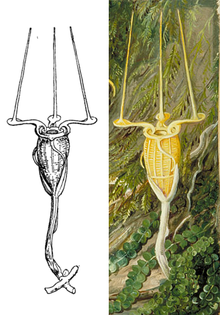Thismia neptunis
Appearance
| Thismia neptunis | |
|---|---|

| |
| Left: Beccari's original illustration. Right: North's painting based on the original illustration. | |
| Scientific classification | |
| Kingdom: | Plantae |
| Clade: | Tracheophytes |
| Clade: | Angiosperms |
| Clade: | Monocots |
| Order: | Dioscoreales |
| Family: | Burmanniaceae |
| Genus: | Thismia |
| Species: | T. neptunis
|
| Binomial name | |
| Thismia neptunis | |
Thismia neptunis is a species of Thismia endemic to Borneo.[1] It was discovered by Italian botanist Odoardo Beccari in 1866, and described in 1878. It was not observed again until 2017, when it was first photographed by a team of biologists from the Czech Republic.[2][3] It was found in the Gunung Matang massif in western Sarawak, in the Malaysian part of the island of Borneo.[2][4]

T. neptunis lives underground, and is a myco-heterotroph, a plant which obtains nutrients through a parasitic relationship with fungi. It does not bloom every year, and when it does, its flower appears above the soil for only a few weeks.[5]
References
[edit]Wikimedia Commons has media related to Thismia neptunis.
- ^ a b "Thismia neptunis Becc". Plants of the World Online. Royal Botanic Gardens, Kew. Retrieved 2020-12-01.
- ^ a b Sochor, Michal; Egertová, Zuzana; Hroneš, Michal; Dančák, Martin (2018). "Rediscovery of Thismia neptunis (Thismiaceae) after 151 years". Phytotaxa. 340: 71–78. doi:10.11646/phytotaxa.340.1.5.
- ^ Nelson, Bryan (March 4, 2018). "Weird subterranean plant not seen in 150 years re-emerges from the underworld". Mother Nature Network.
- ^ "Lost plant refound after 151 years", New Scientist: 18, 10 March 2019
- ^ Daley, Jason. "After 150 Years, This Bizarre Plant Was Rediscovered in Malaysia". Smithsonian.com. Retrieved 9 March 2018.
